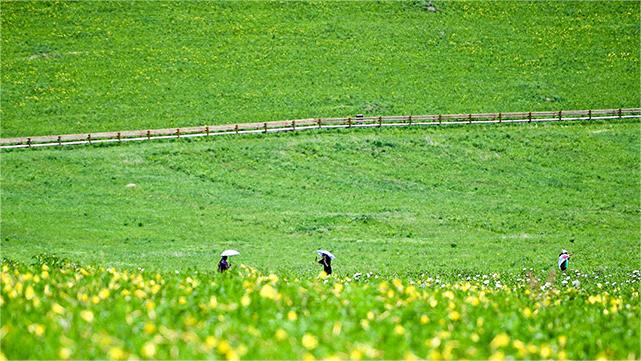On the frontlines: a snapshot of China's anti-drug battle
BEIJING, June 27 (Xinhua) -- In the dead of night along China's southwestern border, a high-stakes car chase unfolded. Police officer Feng Yan (pseudonym) eagerly pursued two vehicles suspected of carrying a significant drug shipment.
The silence was shattered by two loud bangs -- a crash, then a gunshot. In the following chaos, Feng and her colleagues subdued the fleeing traffickers, uncovering over 50 kilograms of heroin.
This encounter is just one chapter in Feng's 12-year career combating drug trafficking in Yunnan Province, which borders the notorious opium-producing Golden Triangle. Her dedication has led to investigations into over 90 drug-related cases, 130 arrests, and the seizure of more than 200 kilograms of narcotics.
The job demands more than just bravery. Most days, Feng dons heavy body armor and a weighty helmet, crawling under vehicles and sifting through discarded garbage in search of evidence. "Every gram of drugs we seize represents one less gram that can harm society," Feng said.
On China's eastern coast, Feng's counterparts are using high-tech methods such as drones to effectively stop the illegal cultivation of opium poppy.
Zhang Hanping, a police officer from Zhejiang Province's Huzhou City with over 10 years of anti-drug experience, and her colleagues have been combing through mountains, rooftops and open-air plantations. "We walk an average of 10 kilometers daily in the mountains, searching for illegal cultivation sites," Zhang explained.
To date, Huzhou police have conducted 78 drone patrols over 489 square kilometers, uncovering 13 illegal opium poppy plantations.
China has intensified its war on drug-related crimes as the world grapples with a rampant drug problem.
Official data shows that between 2013 and 2023, the country cracked 1.11 million cases, arrested around 1.35 million suspects, and seized some 678 tonnes of drugs. By the end of 2023, the number of drug users in China had declined for the sixth consecutive year to 896,000, 20.3 percent lower than the previous year.
China's frontline in its anti-drug fight extends beyond the law enforcement endeavors of individuals like Feng and Zhang. This challenge also focuses on consolidating the achievements made in drug control through improved rehabilitation services.
The Dongpo district rehabilitation center in Meizhou City, southwest China's Sichuan Province, exemplifies this approach.
When Wang Xiaohu (pseudonym) arrived, he was initially uncooperative. Staff members engaged him in earnest conversations, encouraging him to open up and work through his struggles.
"Our main goal is to provide education and rehabilitation services to patients, helping them make a swift return to society," said Li Qingjun, the center's director. The facility offers technical training in electrical work, welding, and cleaning skills.
Wang, now 43 years old, started his own hardware business after receiving welding training at the center.
Since its establishment 12 years ago, the center has offered comprehensive rehabilitation services and support to drug users with illnesses on over 1,600 occasions.
Nationwide, such programs have shown success. In 2023, the number of individuals who had abstained from drugs for three years without relapse reached 4.08 million, a 7.6 percent increase from the previous year.
"It was the assistance of the rehabilitation center that enabled me to overcome my addiction and regain my confidence," Wang reflected.
Photos
Related Stories
- China Coast Guard seizes 8.7 tonnes of narcotics in 5-year crackdown
- 3 suspected drug traffickers repatriated to China from Myanmar
- From shadow to light: China's anti-drug efforts illuminate lives of HIV carriers
- Greater Mekong Sub-region countries join hands to curb drug problems
- Drug cases drop for eight years in China
- China seizes 4.5 tonnes of drugs in border anti-narcotics enforcement
Copyright © 2024 People's Daily Online. All Rights Reserved.









